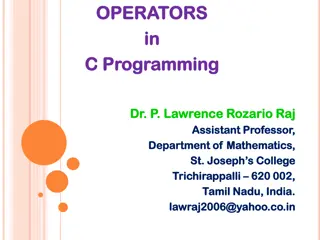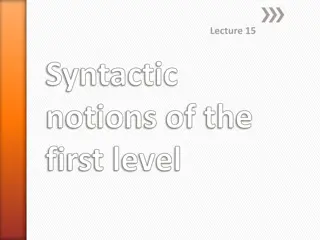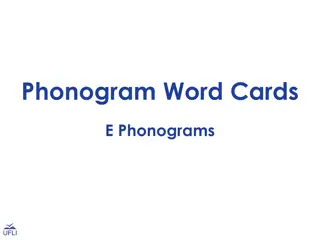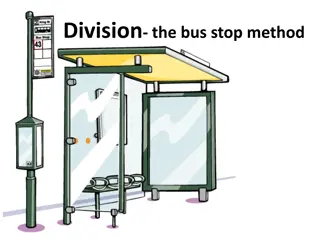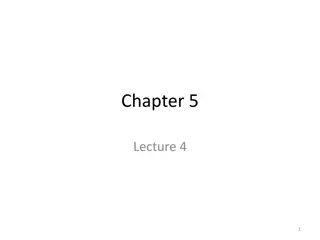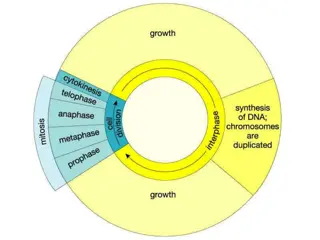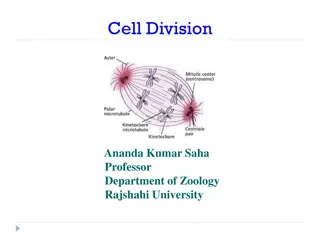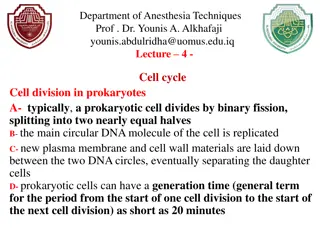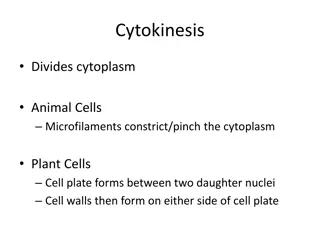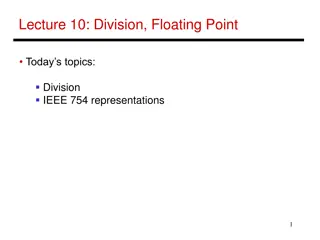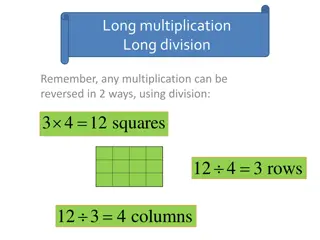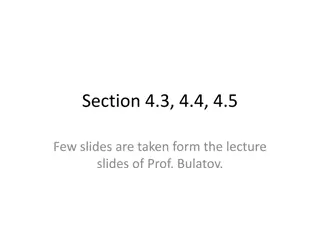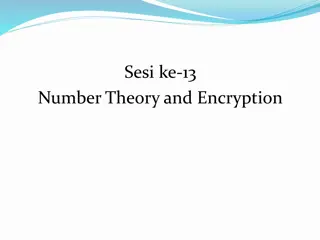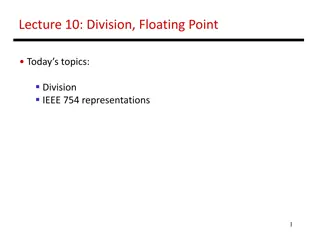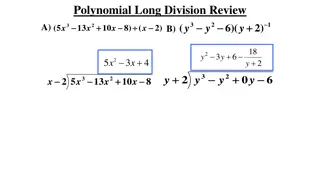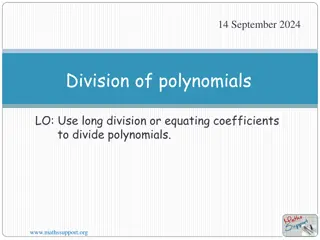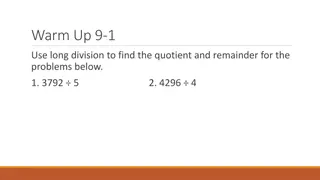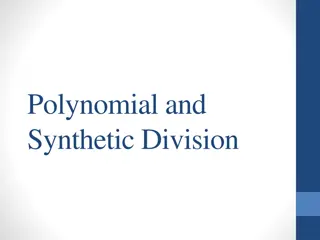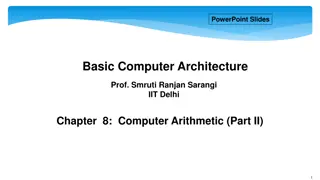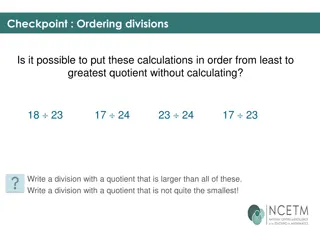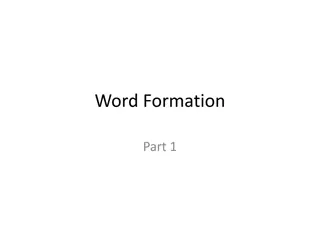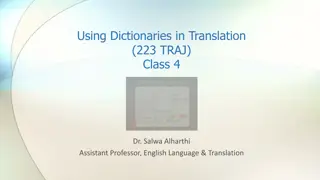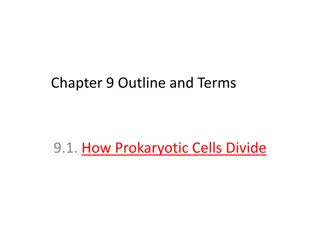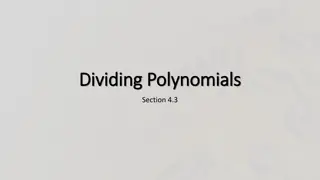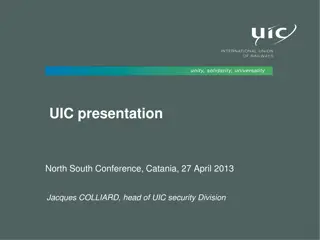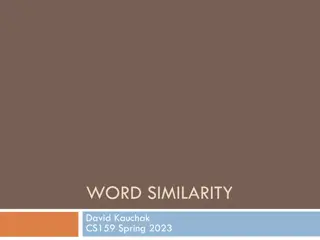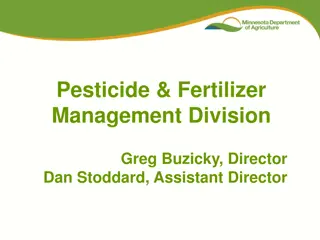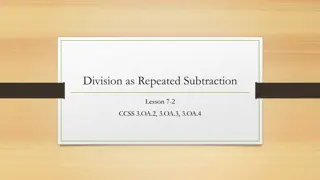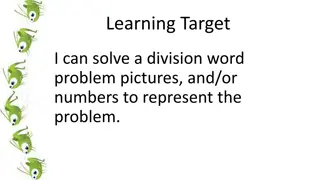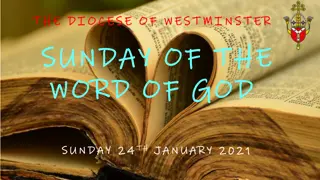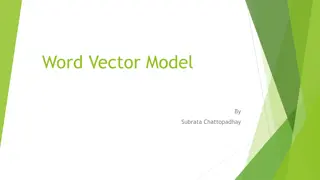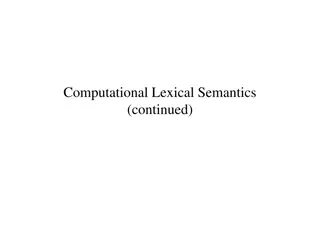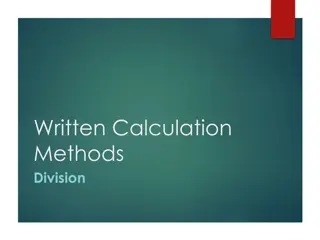Community Policing Division
The North End Tacoma Community Policing Division operates with the aim of coordinating proactive policing efforts with citizens to ensure safety and security in the community. Led by Captain Christopher Travis, the division comprises two lieutenants, an administrative lieutenant, 16 Community Liaiso
2 views • 40 slides
Understanding Arithmetic Operators in C Programming
C programming language provides various arithmetic operators such as addition, subtraction, multiplication, division, and modulo division. Integer division truncates any fractional part, while modulo division produces the remainder of an integer division. When operands in an arithmetic expression ar
1 views • 18 slides
Rhode Island Department of Health Maternal and Child Health Division Overview
The Rhode Island Department of Health Maternal and Child Health Division plays a crucial role in promoting the well-being of mothers, children, and families in the state. Led by a dedicated team, the division focuses on a wide array of programs and services addressing various health issues such as d
0 views • 6 slides
Syntactic Notions of the First Level in Linguistics
In this lecture, the syntactic notions of the first level in linguistics are discussed, focusing on word groups, simple sentences, and the essential features of actual division. The different types of syntagmatic groupings of words, such as notional words, functional words, and their combinations, a
1 views • 19 slides
Strategic Management and Governance Division Overview
The Strategic Management and Governance (SMG) Division plays a vital role in enhancing decision-making, promoting good corporate governance, facilitating strategy execution, and driving innovation within the institution. By fostering collaboration and teamwork among its components, the division aims
0 views • 23 slides
Understanding COBOL Programming: Overview of Divisions and Environment
COBOL, a classic programming language, is explored in this content through its identification division, environment division, data division, and procedure division. The key components include program identification, file controls, and data storage structures. The focus is on enhancing understanding
0 views • 20 slides
Phonogram Word Cards for Teaching Phoneme-Grapheme Correspondences
Explore a collection of phonogram word cards featuring various phoneme-grapheme correspondences for educational activities like word sorts and review games. Enhance phonics skills with word lists containing words sharing the same phonogram, covering a wide range of graphemes and phonemes. Utilize th
0 views • 32 slides
Mathematics Division Practice with the Bus Stop Method
Practice division with the bus stop method using warm-up questions and solve various division problems of different levels. Improve your division skills with visual explanations and step-by-step solutions provided in the content.
0 views • 8 slides
Understanding Word Meaning in Lexical Semantics
Introduction to Chapter 5 Lecture 4.1 discusses the nature of word meaning, major problems of lexical semantics, and different approaches. It explains the concept of a word, prototypical words, lexical roots, lexemes, and word forms, highlighting the importance of the word as a lexeme in lexical sem
1 views • 20 slides
Understanding the Cell Cycle and Mitosis Process
The cell cycle consists of two main periods: Interphase and Mitosis. During Interphase, the cell prepares for division by growing in size and copying chromosomes. Mitosis, the division of the nucleus, results in the formation of two daughter cells with identical chromosome copies. Centrioles and cen
0 views • 26 slides
Understanding Cell Division: Processes and Types
Cell division is a vital process in living cells for growth and reproduction. This article explores the basics of cell division, including the cell cycle, types of cell division (such as mitosis and meiosis), and the initiation of cell division. It also covers key phases like interphase and provides
0 views • 20 slides
Overview of Cell Division in Prokaryotes and Eukaryotic Cells
Cell division plays a crucial role in the growth and reproduction of all organisms. In prokaryotic cells, binary fission is the primary mode of division, while eukaryotic cells undergo a more complex process involving cell growth, DNA replication, chromosome distribution, and cytokinesis. The cell c
0 views • 10 slides
Overview of Cell Division Processes: Mitosis and Meiosis
Cell division involves two main processes: mitosis and meiosis. Mitosis is responsible for the division of somatic cells, producing identical daughter cells. It consists of prophase, metaphase, anaphase, and telophase, followed by cytokinesis. In contrast, meiosis is crucial for the formation of gam
4 views • 37 slides
Understanding Division and Floating Point Arithmetic
Explore the concepts of division and IEEE 754 representations in floating point arithmetic. Learn about the processes involved in division, including steps to find quotient and remainder. Delve into an example of dividing numbers along with hardware implementation for efficient division.
0 views • 19 slides
Illustrated Methods of Multiplication and Division
The content explains various methods of multiplication and division, including long multiplication, lattice method, and short division, with detailed examples and visual aids. It covers concepts like reversing multiplication through division, using single-digit multiples, and step-by-step division t
1 views • 16 slides
Mathematical Division Theorems and Base Conversion Explained
The content covers topics such as the division algorithm, properties of divisibility, the division theorem, proofs, change of radix, and base conversion in mathematics. It delves into how integers can be divided, the relationship between divisors and multiples, and the process of converting numbers
0 views • 33 slides
Basics of Division in Number Theory and Encryption
Understanding arithmetic operations for discrete numbers is crucial in the world of Number Theory and Encryption. This session covers the fundamentals of addition, subtraction, multiplication, and division, emphasizing key terms like dividend, numerator, divisor, quotient, remainder, and fraction. T
0 views • 7 slides
Understanding Division in IEEE 754 Floating Point Representations
Today's lecture delves into division in IEEE 754 representations, illustrating the step-by-step process with examples. The division hardware process, efficient division methods, and handling divisions involving negatives are also covered, emphasizing strategies for simplification and efficiency in a
0 views • 18 slides
Polynomial Long Division Review and Practice
This content provides a detailed review on polynomial long division including step-by-step instructions, examples, and synthetic division practice problems. It covers topics such as descending polynomial order, solving binomial divisors, writing coefficients, determining remainders, and obtaining fi
0 views • 4 slides
Polynomial Division Methods and Examples
Dividing polynomials involves using methods like long division or equating coefficients. By applying these techniques, you can determine whether a polynomial divides exactly or leaves a remainder. The process is similar to long division of numbers, where the dividend is divided by the divisor to obt
0 views • 10 slides
Polynomial Division and Remainder Theorems Explained
Learn how to use long division to find quotients and remainders in polynomial problems. Understand when to use long division or synthetic division. Discover how the remainder theorem works by finding remainders when dividing specific polynomials by different factors. Explore the factor theorem and i
0 views • 6 slides
Polynomial and Synthetic Division Techniques
Learn how to perform polynomial division using long division and synthetic division methods. Understand how to divide polynomials by other polynomials or binomials, utilize the Remainder Theorem and Factor Theorem, and apply these concepts through detailed examples.
0 views • 41 slides
Computer Arithmetic in Basic Computer Architecture
This presentation delves into the realm of computer arithmetic in basic computer architecture, covering essential topics such as addition, multiplication, division, and floating-point operations. The slides illustrate techniques for integer division and the reduction of division problems, along with
0 views • 58 slides
Understanding Division & Fractions
Learn about ordering divisions, different methods of division, visualizing division with fractions, and exploring various division calculations involving fractions. Discover how to find quotients, draw diagrams, and understand the relationships between dividends and divisors in fraction divisions.
0 views • 26 slides
Understanding Word Formation and Coinage in English
Word formation in English involves different processes such as compounding, conversion, and derivational affixation. Compounding combines two or more words to create a new word, while conversion changes the word class without affixes. Word coinage includes compounds, acronyms, back-formations, abbre
0 views • 10 slides
Understanding the Role of Dictionaries in Translation
Dictionaries play a crucial role in translation by helping users find information about linguistic signs, word division, spelling, and word formation. The lemma serves as a representative of a lexical item in a dictionary, aiding users in locating specific entries. Word division information can assi
0 views • 12 slides
Department of Corrections Division of Addiction Services Organizational Overview
The Department of Corrections Division of Addiction Services, led by Director Sarah G. Johnson, is committed to changing lives and outcomes through their organizational structure. The division is divided into regions managed by experienced professionals, ensuring effective programs and services are
0 views • 38 slides
Cell Division Mechanisms in Prokaryotic and Eukaryotic Cells
Prokaryotic cells divide through binary fission, while eukaryotic cells undergo mitosis with nuclear division and cytokinesis. Prokaryotic cells lack a nucleus and divide by replicating DNA and forming two identical daughter cells. Eukaryotic chromosomes, associated with histone proteins, undergo co
0 views • 56 slides
Understanding Polynomial Division Methods
Learn how to divide polynomials using long division and synthetic division techniques. Explore the processes of dividing polynomials by other polynomials or binomials, using the Remainder Theorem, and applying synthetic division to evaluate polynomials. Master the steps with detailed examples and vi
0 views • 14 slides
UIC Security Division Overview and International Activities
The UIC Security Division plays a crucial role in supporting the security platform of the International Union of Railways (UIC). Headed by Jacques Colliard, the division is based in Paris and consists of key personnel like Marie-Hélène Bonneau, Jos Pires, and Laetitia Granger. The division's activ
0 views • 12 slides
Insights on Advising Division III Student-Athletes and Recruiting Strategies
Gain valuable insights on advising Division III student-athletes from experts at the 2019 WACAC workshop. Learn about NCAA Division comparisons, reasons behind unsuccessful student-athlete recruitment, and effective ways to market students to Division III institutions. Explore a sample email templat
0 views • 8 slides
Understanding Text Similarity Techniques in NLP
Explore various text similarity techniques in Natural Language Processing (NLP), including word order, length, synonym, spelling, word importance, and word frequency considerations. Topics covered include bag-of-words representation, vector-based word similarities, TF-IDF weighting scheme, normalize
2 views • 62 slides
Pesticide & Fertilizer Management Division Overview
The Pesticide & Fertilizer Management Division is a key state agency in Minnesota responsible for regulating pesticides and fertilizers, protecting groundwater, responding to emergencies, managing spills, and promoting agricultural water quality. The division works with farmers, industry stakeholder
0 views • 11 slides
Mastering Division Through Repeated Subtraction
Explore the concept of division as repeated subtraction with engaging examples and thought-provoking problems. Practice dividing items into equal groups, enhance problem-solving skills, and deepen understanding of division concepts. From dividing tacos among friends to distributing strawberries and
0 views • 12 slides
Solving Division Word Problems with Grasshoppers
In this educational content, students are guided through solving division word problems using a fun scenario involving grasshoppers. The problem involves determining the number of grasshoppers when given the total number of legs. Through visual representations and strategic thinking, students learn
0 views • 6 slides
The Sunday of the Word of God Celebration - 24th January 2021
The Sunday of the Word of God, observed on the 24th of January 2021, is dedicated to the celebration, study, and dissemination of the Word of God. Pope Francis encourages Catholics worldwide to deepen their relationship with God through His Word. The event highlights the importance of valuing both t
0 views • 27 slides
Understanding Word Vector Models for Natural Language Processing
Word vector models play a crucial role in representing words as vectors in NLP tasks. Subrata Chattopadhyay's Word Vector Model introduces concepts like word representation, one-hot encoding, limitations, and Word2Vec models. It explains the shift from one-hot encoding to distributed representations
0 views • 25 slides
Establishing Plant Cell Division Plane: Key Mechanisms Unveiled
Plants exhibit a unique cell division process essential for growth and development. This process involves intricate control over the positioning of a new cell wall, crucial for proper patterning. Symmetrical and asymmetrical divisions play distinct roles in plant body formation, each regulated by sp
0 views • 9 slides
Understanding Word Sense Disambiguation in Computational Lexical Semantics
Word Sense Disambiguation (WSD) is a crucial task in Computational Lexical Semantics, aiming to determine the correct sense of a word in context from a fixed inventory of potential word senses. This process involves various techniques such as supervised machine learning, unsupervised methods, thesau
0 views • 67 slides
Year 3 Division Methods and Facts Overview
Explore written calculation methods for division in Year 3, including facts related to times tables such as 2, 3, 4, 5, 8, and 10. Learn about mental division with remainders and progress to dividing numbers up to 4 digits by one- or two-digit numbers using short and long division in Year 4 and 5. D
0 views • 18 slides

